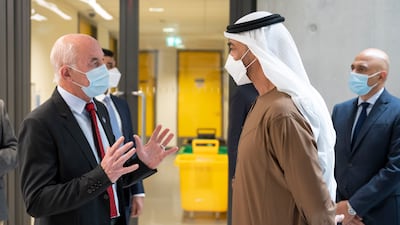Recognising the despair in young eyes is something that Dr Angeliki Asimaki does from a personal point of view, for the cardiac specialist knows only too well the struggles that families face when genetic heart conditions are discovered.
The 43-year-old has undergone nine heart operations because of a condition that she was born with, and for two decades the cardiac surgeon has also been developing techniques to tackle sudden cardiac death.
With thousands of youngsters dying from SCD every year, she has now teamed up with the UAE-backed rare diseases research centre at Great Ormond Street Hospital in London for trials of a test to help to save lives.
“I have worked on this my entire life,” Dr Asimaki told The National. “I decided to become involved in this field of work because I was born with two congenital heart defects.
“I have lived with a pacemaker since I was 15 and I’m currently going through my fifth generator.”
Now, she hopes to provide some solutions that lower the risk of death in those who suffer heart attacks caused by certain paediatric conditions. By using a simple cheek swab test, she discovered that the protein changes in a person’s heart are mirrored in their cheeks and instead of doctors needing to carry out invasive surgery and detailed examinations, it can swiftly reveal if a person is at imminent risk of a cardiac arrest.
At her side is Dr Juan Kaski, consultant paediatric cardiologist and the lead director of the Inherited Cardiovascular Diseases Unit at Great Ormond Street Hospital, where the Zayed Centre for Research into Rare Disease in Children in based.
Dr Kaski sees first hand the effect of this condition on his young patients and wants to meet the desire for answers presented to him on a daily basis.

“The first question parents ask me is whether their child is going to die suddenly,” he told The National. “To be able to involve them and use this test to reassure them is massive.”
The breakthrough technology means children with a potentially deadly heart condition can be quickly and safely monitored and doctors can rapidly act to save their lives.

“I studied the hearts of SCD victims and established the group of proteins that move in the heart and translated this to the cheek in already diagnosed patients. We can detect changes in the heart in the cheek and pick it up before the disease is manifest.

“Although children are born with the actual DNA mistake, they do not show clinical abnormalities until their adolescent years and even after this point the disease can be dormant for a number of years and then it undergoes a hot phase where there’s a period of unstable activity which actually comes with the highest risk of SCD.
“We got funding to do a study to follow paediatric patients which carry these DNA mistakes with the aid of the cheek smears. The proteins start moving a little bit before the disease onset. So, before the disease wakes up that’s when you start having shifts on your proteins.
“Essentially, what we are trying to establish is a completely risk-free test to allow us to increase the surveillance of these children and establish management plans for when these proteins start moving.”

The British Heart Foundation has provided £270,000 funding for the three-year trial at the Zayed Centre for Rare Diseases at GOSH.
Dr Asimaki, who is also a senior lecturer at St George’s, University of London, hopes to one day use the same technique on adults at the south London hospital.
The cheek swab can, hopefully, be used to monitor a disease called Arrhythmogenic cardiomyopathies, which is a major cause of sudden cardiac deaths across all populations of the world, affecting one in 1,000 people.
ACM is believed to account for 25 per cent of sudden deaths in children bearing such a mutation.
The condition appears in adolescence and presently children who have it are monitored on a yearly basis through a range of clinical tests that include electrocardiograms, echo cardiograms, magnetic resonance imaging and heart monitors.
The cheek swabs enable the doctors to get a quick snapshot of any changes in the heart.
“Presently there are many tests and it is quite emotionally burdening for the children and their families and the tests are very costly in terms of the time they take and the cost to the NHS,” she said. “So our test is providing a much-needed window into the minute changes happening in the hearts of ACM patients, in a totally risk-free, non-invasive way.
“Doctors can be warned about which of their patients are most at risk of dangerous heart rhythms and other symptoms, allowing them to tailor treatment to ensure that each patient receives the best care for them.
“Patients, particularly children, have told us they hugely prefer the speed and ease of the cotton bud cheek swab compared to alternatives like blood tests.
“Doing the annual standard clinical investigations at the moment costs the NHS more than £1,000 per child, analysing the location of proteins in quarterly cheek swabs in four sets of swabs costs me £100 so we are talking a 10-fold reduction in costs.”
The team have created DIY home kits for families to use and post back to the hospital.
It means if parents have concerns they can test their children and quickly get the results back so preventive action can be taken, if needed.
“People with ACM often live with day-to-day worries because of the unpredictable nature of their condition, in which dangerous symptoms can start with little to no warning,” Professor Bryan Williams, chief scientific officer at the British Heart Foundation, said.
“The simple monitoring test being developed by Dr Asimaki and her team has the potential to provide reassurance to patients and their families that their condition is being kept under a watchful eye by medical professionals.”
If children have a single genetic mistake linked to the disease its onset usually happens between ages 14 to 17, but in children bearing two mutations the disease onset can be much earlier.
The team is monitoring 115 children in the trial aged between two months old to 18, and is also conducting tests in the Netherlands and Dr Asimaki’s home nation, the Greek Island of Naxos, which has a high number of children with the disease.
The disease is also prevalent in children in the UAE and those receiving treatment for it at Great Ormond Street Hospital will also be able to take part in the trial.












“The trial is only on patients in the UK but I expect as we raise awareness of the study we will get referrals from places like the Middle East of people wanting to take part,” Dr Kaski said.
“The advantage of this trial is to put us in a better position to save lives. I feel really privileged to help these families and give them hope.”

One of the youngsters taking part in the trial is 10-year-old Bea.
She started experiencing symptoms of an unusually fast heart rhythm, called ventricular tachycardia, including shortness of breath and dizziness, three years ago and was diagnosed with ACM.
“The test is adding another layer of reassurance to the family that the condition is being monitored. We think it’s so important to take part in this research to improve how ACM is monitored and managed for children in the future,” her mother Liz said.
“Every time she experiences a symptom, a recording of her heart rhythm is sent to GOSH and reviewed within an hour, which gives us some reassurance. It saves her having to go for overnight monitoring in hospital and missing school every time.
“Aside from going in for regular check-ups at GOSH, we feel it’s really important to not let Bea’s condition get in the way of a normal childhood.”
It is research nurse Emma Field's job at GOSH to talk to the families and ask them to be involved and she collects the samples.
“I approach new patients every week to take part in the trial and the numbers are going up,” she told The National. “The feedback from patients and families is amazing. It is not painful or uncomfortable and the children and their families are keen to take part and help us.”
Dr Asimaki is hoping the test can be rolled out globally and help save the lives of other heart patients.
“The majority of the people in my shoes work for the patient because everything we do is done solely for their benefit but I can also be in their shoes, I do not just work for the patient, I am one myself,” she said.
“This work is really important to me and I hope it can be rolled out. ACM affects all populations of the world, actually certain countries show even higher incidents such as the Netherlands, Greece and the Middle East.
“I really hope the swabs can be applied to every country, they will save lives, especially if the home kits become more widely available.
“I’m incredibly proud and happy that even if my work helps save one child then I feel like I have fulfilled my purpose in life.”


